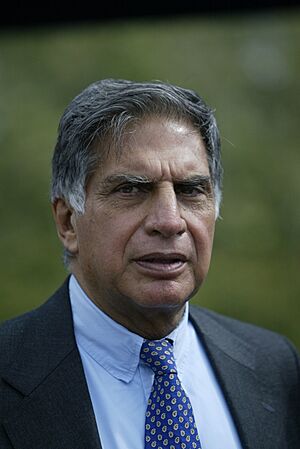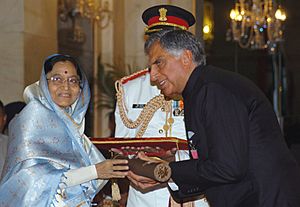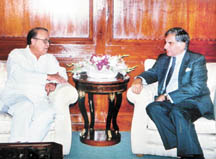Ratan Tata facts for kids
Quick facts for kids
Ratan Tata
|
|
|---|---|

Tata in 2005
|
|
| Born |
Ratan Naval Tata
28 December 1938 |
| Died | 9 October 2024 (aged 86) Mumbai, India
|
| Alma mater | Cornell University (BArch) |
| Occupation | Industrialist, philanthropist |
| Title | Chairman Emeritus, Tata Sons and Tata Group |
| Term |
|
| Predecessor | J. R. D. Tata |
| Successor |
|
| Parent(s) |
|
| Relatives | Tata family |
| Awards |
|
Ratan Naval Tata (born 28 December 1937 – died 09 October 2024) was a famous Indian businessman. He was the chairman of the Tata Group from 1990 to 2012. He also served as an interim chairman for a short time in 2016-2017.
Ratan Tata was known for leading the Tata Group to become a global company. He helped them buy big international businesses like Tetley tea, Jaguar Land Rover cars, and Corus steel. He was also a very generous person, giving a large part of his wealth to charity. He received India's second-highest civilian award, the Padma Vibhushan, in 2008.
Contents
Early Life and Education
Ratan Tata was born in Bombay (now Mumbai) on 28 December 1937. He came from a Parsi family. His father, Naval Tata, was adopted into the famous Tata family. His mother was Sooni Tata.
When Ratan was 10, his parents separated. His grandmother, Navajbai Tata, raised him. He had a younger brother, Jimmy, and a half-brother, Noel Tata.
Ratan went to several schools, including Campion School, Mumbai and Cathedral and John Connon School in Mumbai. He also studied at the Bishop Cotton School and Riverdale Country School in New York City.
He later went to Cornell University. In 1959, he earned a degree in architecture there. Years later, in 2008, Ratan Tata gave $50 million to Cornell University. This was the largest gift from an international donor in the university's history.
Career Highlights
Ratan Tata started working at the Tata Group in 1961. He began on the factory floor at Tata Steel. In the 1970s, he got a management role. He successfully turned around a company called National Radio and Electronics (NELCO).
In 1991, J. R. D. Tata retired as chairman of Tata Sons. Ratan Tata was chosen to take his place. At first, some company leaders didn't like his new ideas. They were used to having a lot of freedom.
Ratan Tata brought in new rules to make the company stronger. He set a retirement age for leaders. He also made sure all smaller companies reported directly to the main Tata office. He wanted all parts of the Tata Group to work together. He focused on new ideas and let younger employees take on more responsibility.
During his 21 years as chairman, the Tata Group grew a lot. Its income increased over 40 times, and its profits grew over 50 times. When he started, most of Tata's sales were raw materials. By the end, most sales came from well-known brands.
He led the company to buy many international businesses:
- Tata Tea bought Tetley.
- Tata Motors bought Jaguar Land Rover.
- Tata Steel bought Corus.
These big purchases helped Tata become a global company. More than 65% of its income came from outside India.
Ratan Tata also had the idea for the Tata Nano car. This car was very affordable, making it possible for many more Indian families to own a car. He also supported the development of electric vehicles in India.
In 2012, Ratan Tata retired as chairman when he turned 75. After his retirement, there was a period of change in leadership. In 2016, he briefly returned as interim chairman. In 2017, Natarajan Chandrasekaran became the new chairman of Tata Sons.
Ratan Tata also invested his own money in many new companies, called startups. He invested in over 30 startups. These included online shopping sites like Snapdeal and companies like Ola Cabs. He also invested in Chinese smartphone company Xiaomi.
Philanthropic Work
Ratan Tata was a strong supporter of helping others. He believed in improving education, medicine, and life in rural areas. He was seen as a top philanthropist in India.
He supported the University of New South Wales to create better water systems for areas that needed them.
A building at the University of California, San Diego (UC San Diego) is named Tata Hall. It opened in 2018. The Tata Trusts gave $70 million to UC San Diego in 2016. This money helped create the Tata Institute for Genetics and Society (TIGS), which is in the building. Tata Hall is a modern research facility for science. It has labs, offices, and meeting spaces to help researchers work together.
The Tata Education and Development Trust also created a $28 million scholarship fund for Cornell University. This fund helps students from India attend Cornell, no matter their financial situation. About 20 students receive this scholarship each year.
In 2010, Tata Group companies and charities gave $50 million to build an executive center at Harvard Business School (HBS). This center is called Tata Hall after Ratan Tata. It is used for special education programs for business leaders.
The Tata Innovation Center at Cornell Tech is also named after Ratan Tata. It brings together students, teachers, and businesses. It helps new companies grow.
Tata Consultancy Services (TCS), a Tata Group company, gave $35 million to Carnegie Mellon University (CMU). This was the largest donation ever by a company to CMU. The money was for a building called TCS Hall. It is used to research smart computer systems and self-driving cars.
In 2014, the Tata Group gave ₹950 million (about $15 million USD at the time) to the Indian Institute of Technology, Bombay. This was the largest donation in the institute's history. It helped create the Tata Center for Technology and Design (TCTD). This center works on solving problems for communities with limited resources.
Tata Trusts also gave ₹750 million (about $12 million USD at the time) to the Centre for Neuroscience at the Indian Institute of Science. This money helps study Alzheimer's disease to find ways to diagnose and treat it early.
The Tata Group also formed the MIT Tata Center of Technology and Design at Massachusetts Institute of Technology (MIT). Its goal is to help communities with limited resources, especially in India.
Board Memberships and Affiliations
Ratan Tata was the interim chairman of Tata Sons. He also led the two main Tata trusts, Sir Dorabji Tata and Allied Trusts and Sir Ratan Tata Trust. These trusts own a large part of Tata Sons.
He was a member of the Prime Minister's 'Council on Trade and Industry' in India. He also served on the jury for the Pritzker Architecture Prize, a very important award for architects.
Ratan Tata was on the Board of Trustees at Cornell University. He advised the university on international projects, especially those related to India. He was named Cornell Entrepreneur of the Year in 2013.
He was also a director on the boards of companies like Alcoa Inc. and Mondelez International. He was a member of the board of trustees for the University of Southern California and Harvard Business School.
Honours and Awards

Ratan Tata received many important awards for his work:
- In 2000, he received the Padma Bhushan.
- In 2008, he received the Padma Vibhushan. These are the third and second highest civilian awards in India.
- He received the 'Maharashtra Bhushan' in 2006 for his work in Maharashtra.
- He received the 'Assam Baibhav' in 2021 for his help in cancer care in Assam.
He also received many international honors:
- In 2009, he was made an Honorary Knight Commander of the Order of the British Empire (KBE) by Queen Elizabeth II.
- In 2014, he received the even higher honor of Honorary Knight Grand Cross of the Order of the British Empire (GBE) from Queen Elizabeth II.
- In 2016, he received the Commander of the Legion of Honour from the Government of France.
- In 2023, he received the Honorary Officer of the Order of Australia (AO) from King Charles III.
He also received many honorary doctorates from universities around the world, recognizing his achievements in business and philanthropy.
Personal Life and Death
Ratan Tata never married and did not have children. He once said that he came close to getting married four times but never did.
Ratan Tata passed away in Mumbai on 9 October 2024, at the age of 86. He is remembered as one of India's most respected business leaders and philanthropists.
See also
 In Spanish: Ratan Tata para niños
In Spanish: Ratan Tata para niños
 | Lonnie Johnson |
 | Granville Woods |
 | Lewis Howard Latimer |
 | James West |


